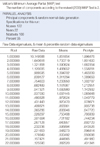Abstract
Purpose
The purpose of this study was to identify validity the Korean version of resilience scale and identify performance status and resilience in patients with colorectal cancer.
Methods
A sample of 110 patients with colorectal cancer was recruited from a hospital in Seoul. Data were analyzed using descriptive statistics, t-test, factor analysis, MAP test and Parallel test and multiple regression with the SPSS/WIN 12.0 program.
Results
The reliability, validity, and factor analytic structure of the scale were evaluated. The scale demonstrated good psychometric properties and factor analysis yielded two factors. The resilience for colorectal cancer patients showed a significant difference according to marital status and performance status. The two variables were the significant factors influencing resilience, which they explained 26.5% of the variance.
Figures and Tables
Table 1
The Resilience according to Demographical and Clinical Characteristics for Subjects (N =110)

References
1. The Korea Central Cancer Registry, National Cancer Center. Annual report of cancer statistics in Korea in 2010. Seoul: Ministry of Health and Welfare;2012.
2. National Cancer Information Center. National cancer statistics. Accessed October 2, 2013. http://www.cancer.go.kr/cms/statics/survival_rate/index.html.
3. Park HM, Ha NS. Influencing predictors of quality of life in colorectal cancer patient with colostomy. Clin Nurs Res. 2006; 12:123–131.
4. Cappiello M, Cunningham RS, Knobf MT, Erdos D. Breast cancer survivors: information and support after treatment. Clin Nurs Res. 2007; 16:278–293.
5. Koo BJ. The development and effect of longotherapy-based resilience
promotion program for gynecologic cancer women [dissertation]. Seoul: Korea Univ.;2008.
6. Haase JE. The adolescent resilience model as a guide to intervensions. J Pediatr Oncol Nurs. 2004; 21:289–299.

7. Kadner KD. Resilience: responding to adversity. J Psychosoc Nurs Ment Health Serv. 1989; 27:20–25.

8. Irwin ST. Resilience rather recovery: a contextual framework on adaptation following bereavement. New York: The Free press;2008.
10. Cotrim H. Impact of colorectal cancer on patient and family: Implications for care. Eur J Oncol Nurs. 2008; 12(3):217–226.

11. Sørensen JB, Klee M, Palshof T, Hansen H. Performance status assessment in cancer patients. An inter-observer variability study. Br J Cancer. 1993; 67(4):773–775.

12. List MA, Mumby P, Haraf D, Siston A, Mick R, MacCracken E, et al. Performance and quality of life outcomes in patients completing concomitant chemoradiotherapy protocols for head and neck cancer. Qual Life Res. 1997; 6:274–284.
13. Sargent DJ, Köhne CH, Sanoff HK, Bot BM, Seymour MT, de Gramont A, Goldberg M. Pooled safety and efficacy analysis examining the effect of performance status on outcomes in nine first-line treatment trials using individual data from patients with metastatic colorectal cancer. J Clin Oncol. 2009; 27(12):1948–1955.

14. Shin H, Lee JH. A correlation study on the resilience of children with cancer and their mothers. J Korean Oncol Nurs. 2008; 8:24–31.
15. Moon JR, Jung YY, Huh J, Kang IS, Park SW, Yang JH, et al. Relationship between depression and resilience in adolescents with congenital heart disease. Korean J Pediatr. 2006; 49:523–528.

16. Cha K, Kim K. Impact of uncertainty on resilience in cancer patients. Asian Oncol Nurs. 2012; 12(2):139–146.

17. Wagnild GM, Young HM. Development and psychometric evaluation of the resilience scale. J Nurs Meas. 1993; 1(2):165–178.
18. Song YS. Determinants of resilience of the physically disabled at home [dissertation]. Busan: Kosin Univ.;2004.
19. Shin YH, Sim MK, Kim TI. Resilience and health-related quality of life in children with chronic illness. J Korean Acad Child Health Nurs. 2006; 12:295–303.
20. Sim MK. Influence of resiliency factors on adaptation in families of children with cancer. J Korean Acad Child Health Nurs. 2004; 10:383–394.
22. Zubrod CG, Schneiderman M, Frei E, Brindley C, Lennard Gold G, Shnider B, et al. Appraisal of methods for the study of chemotherapy of cancer in man: comparative therapeutic trial of nitrogen mustard and triethylene thiophosphoramide. J Chronic Dis. 1960; 11(1):7–33.

23. Horn JL. A rationale and test for the number of factors in factor analysis. Psychometrika. 1965; 30(2):179–185.

24. Velicer W, Eaton C, Fava J. Construct explication through factor or component analysis: a review and evaluation of alternative procedures for determining the number of factors or components. In : Goffin R, Helmes E, editors. Problems and Solutions in Human Assessment. New York: Springer US;2000. p. 41–71.
25. Chaiy SI. Marketing research. 3rd ed. Seoul: B&M Book;2007.
26. Nunnaly JC, Berstein IH. Psychometric Theory. 3rd ed. New York: McGraw-Hill, WC;1994.
27. Choi KS, Park JA, Lee J. The effect of symptom experience and resilience on quality of life in patients with colorectal cancers. Asian Oncol Nurs. 2012; 12(1):61–68.

28. Han MR. Resilience, social support, spirituality in wives of alcoholics [dissertation]. Seoul: Yonsei Univ.;2004.




 PDF
PDF ePub
ePub Citation
Citation Print
Print






 XML Download
XML Download